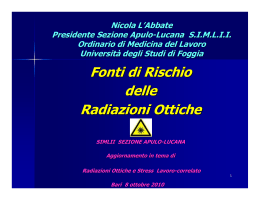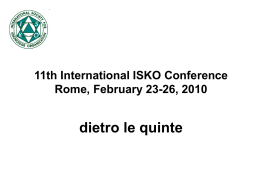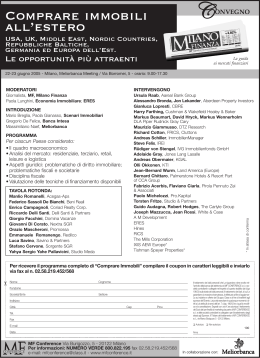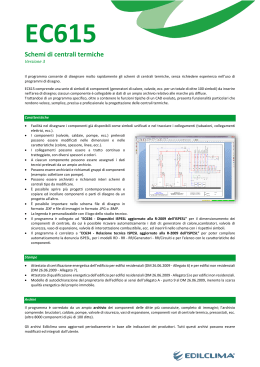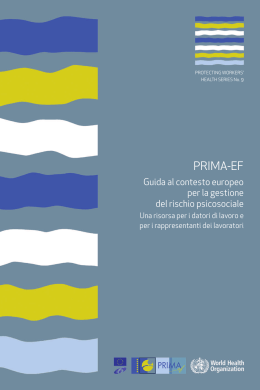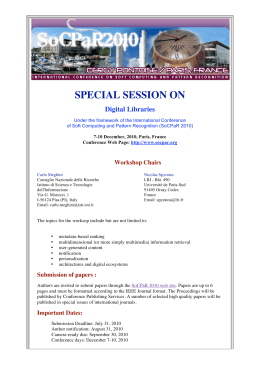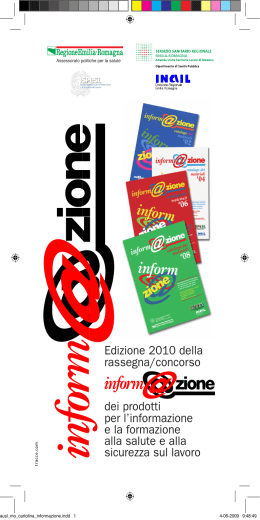9ª Conferenza European Academy of Occupational Health Psychology 29-31 Marzo Pontificia Università Urbaniana Via Urbano VIII, 16 - Roma 9ª Conferenza della European Academy of Occupational Health Psychology La European Academy of Occupational Health Psychology e l’Istituto Superiore per la Prevenzione e la Sicurezza del Lavoro (ISPESL) sono lieti di invitarVi a partecipare nel marzo 2010, alla Conferenza della European Academy of Occupational Health Psychology. La European Academy of Occupational Health Psychology è stata fondata nel 1999 per fornire un quadro di riferimento Europeo in materia di ricerca, formazione e pratica professionale nella disciplina. Una delle attività di maggior rilievo è costituita dalla conferenza biennale che vede riuniti rappresentanti provenienti da più di trenta Paesi, con lo scopo di condividere le innovazioni e le buone pratiche nel settore. La Conferenza è stata co-organizzata con il Dipartimento di Medicina del Lavoro dell’Istituto Superiore per la Prevenzione e la Sicurezza del Lavoro (ISPESL). L’evento si svolgerà nell’arco di tre giorni, dal 29 al 31 marzo 2010, presso la Pontificia Università Urbaniana. Al centro di Roma, vicino al Vaticano, questa prestigiosa sede sarà il luogo ideale per ricercatori, professionisti, formatori, specializzandi e dottorandi, per discutere degli avanzamenti più rilevanti nel campo della psicologia del lavoro e della promozione della qualità della vita lavorativa. Un caloroso benvenuto e Vi aspettiamo a Roma. Sergio Iavicoli, Presidente della Conferenza 2 Tom Cox, Presidente, EAOHP SONO STATI RICHIESTI I SEGUENTI PATROCINI: • Ministero del Lavoro, della Salute e delle Politiche Sociali • Regione Lazio • Provincia di Roma • Comune di Roma • Agenzia Europea per la Sicurezza e la Salute sul Lavoro • International Commission on Occupational Health (ICOH) • Società Italiana di Medicina del Lavoro ed Igiene Industriale (SIMLII) COMITATO PROMOTORE Tom Cox - Presidente, EAOHP Sergio Iavicoli - Presidente della Conferenza Antonio Moccaldi - Commissario Straordinario, Istituto Superiore per la Prevenzione e la Sicurezza del Lavoro (ISPESL) Umberto Sacerdote - S. Commissario Straordinario, Istituto Superiore per la Prevenzione e la Sicurezza del Lavoro (ISPESL) COMITATO SCIENTIFICO Gail Kinman - Coordinatore del Comitato Scientifico - University of Bedfordshire, Regno Unito Sergio Iavicoli - Presidente della Conferenza - Istituto Superiore per la Prevenzione e la Sicurezza del Lavoro (ISPESL), Italia Claudio Barbaranelli - Università di Roma “Sapienza”, Italia Julian Barling - Queen’s University, Canada Laura Borgogni - Università di Roma “Sapienza”, Italia Giancarlo Cesana, Università di Milano, Italia Stacey Conchie - Liverpool University, Regno Unito Tom Cox - University of Nottingham, Regno Unito Mark Cropley - University of Surrey, Regno Unito Hans de Witte - Catholic University of Leuven, Belgio Patrizia Deitinger - Istituto Superiore per la Prevenzione e la Sicurezza del Lavoro (ISPESL), Italia Philip Dewe - Birkbeck College, University of London, Regno Unito Paul Flaxman - City University, Regno Unito Roxanne Gervais, Health and Safety Laboratory, Regno Unito Sabir Giga - University of Bradford, Regno Unito Amanda Griffiths, University of Nottingham, Regno Unito Jonathan Houdmont - University of Nottingham, Regno Unito Michelle Inness - University of Alberta, Canada Fiona Jones - University of Leeds, Regno Unito Kevin Kelloway - St. Mary’s University, Canada Peter Kelly, Health and Safety Executive, Regno Unito Michiel Kompier - Radboud University Nijmegen, Paesi Bassi Stavroula Leka - University of Nottingham, Regno Unito Colin Mackay - Health and Safety Executive, Regno Unito Almuth McDowall - WorkLife Consulting, Regno Unito Elena Natali - Istituto Superiore per la Prevenzione e la Sicurezza del Lavoro (ISPESL), Italia 3 Andrew Noblet - Deakin University, Australia José Mª Peiró - University of Valencia, Spagna Marta Petyx - Istituto Superiore per la Prevenzione e la Sicurezza del Lavoro (ISPESL), Italia Eusebio Rial-Gonzalez - European Agency of Occupational Safety and Health (EU-OSHA) Per Oystein Saksvik - Norwegian University of Science and Technology, Norvegia Steve Sauter - National Institute of Occupational Safety and Health (NIOSH), USA Norbert Semmer - University of Bern, Svizzera Arie Shirom - Tel Aviv University, Israele Johannes Siegrist - University of Dusseldorf, Germania Noreen Tehrani - Chartered occupational, counselling and health psychologist, Regno Unito Lois Tetrick - George Mason University, USA Sturle Tvedt - Norwegian University of Science and Technology, Norvegia SEGRETERIA ORGANIZZATIVA Aditya Jain, Coordinatore della Segreteria Organizzativa - University of Nottingham, Regno Unito Marina Catelli - Istituto Superiore per la Prevenzione e la Sicurezza del Lavoro (ISPESL), Italia Pasquale Fruscella - Istituto Superiore per la Prevenzione e la Sicurezza del Lavoro (ISPESL), Italia Monica Ghelli - Istituto Superiore per la Prevenzione e la Sicurezza del Lavoro (ISPESL), Italia Juliet Hassard - University of Nottingham, Regno Unito Jonathan Houdmont - University of Nottingham, Regno Unito Stavroula Leka - University of Nottingham, Regno Unito Elena Natali - Istituto Superiore per la Prevenzione e la Sicurezza del Lavoro (ISPESL), Italia Carlo Petyx - Istituto Superiore per la Prevenzione e la Sicurezza del Lavoro (ISPESL), Italia Jessica Tang - University of Nottingham, Regno Unito RELAZIONI PREORDINATE Francesco Avallone - Università di Roma “Sapienza”, Italia Cary Cooper - Lancaster University, Regno Unito Giovanni Costa - Università di Milano, Italia 4 SESSIONE SPECIALE Organizzata dall’ISPESL La gestione dei rischi psicosociali: buone pratiche e modelli di successo Oggi i problemi relativi ai rischi psicosociali hanno una rilevanza sempre maggiore per il mondo del lavoro. La Risoluzione del Consiglio Europeo del 25 giugno 2007, relativa ad una nuova strategia Comunitaria sulla salute e la sicurezza nei luoghi di lavoro (2007-2012) ha ribadito, tra gli obiettivi prioritari da perseguire, il proseguimento del dialogo sociale sulla prevenzione della violenza e le molestie sul luogo di lavoro e la valutazione e l’implementazione dell’Accordo Europeo fra le parti sociali sullo stress lavoro-correlato. In Italia molti aspetti dell’Accordo Europeo sono stati recepiti nel D.Lgs 81/08 con attribuzione di efficacia ai contenuti dello stesso, il quale esplicita come la valutazione dei rischi debba riguardare tutti i rischi per la salute e sicurezza dei lavoratori, ivi compresi quelli relativi allo stress lavoro-correlato. Nell’ambito della prima giornata della Conferenza si terrà una sessione speciale per presentare le iniziative nazionali e internazionali finalizzate alla prevenzione dei rischi psicosociali sul luogo di lavoro. La sessione offrirà un importante forum di discussione e confronto tra gli esperti a livello nazionale e internazionale e sarà una sede opportuna per promuovere possibili strategie per la valutazione e la gestione dei fattori di rischio psicosociale nel mondo del lavoro in continuo cambiamento. È prevista la traduzione simultanea in Italiano e in Inglese. È possibile effettuare l’iscrizione e il relativo pagamento dal 20 Luglio 2009 al 15 Marzo 2010 solo via web: http://eaohp.org/conference.aspx. Per i partecipanti interessati ad assistere alla Sessione Speciale è obbligatoria l’iscrizione almeno per la giornata del 29 Marzo. Per ulteriori informazioni e aggiornamenti è possibile consultare il sito http://eaohp.ispesl.it o scrivere al seguente indirizzo e-mail [email protected]. 5 CONTRIBUTI SCIENTIFICI Verranno accettati lavori sotto forma di presentazioni orali, posters, symposia e workshops da parte di ricercatori, professionisti e formatori esperti in psicologia del lavoro e aree affini. Invio proposte abstract: 20 Luglio 2009 – 20 Novembre 2009. Accettazione lavori entro il 18 Dicembre 2009. Si prevedono quattro tipi di contributi: Presentazioni orali. Ogni relatore avrà a disposizione 15 minuti seguiti da 5 minuti per eventuali domande e per la discussione. Presentazione Poster. I temi dei poster tratteranno delle ricerche in corso e delle nuove linee di sviluppo configurandosi come un importante momento di interazione tra i partecipanti alla Conferenza. I posters dovranno essere redatti in modo leggibile e presentare una grafica interessante. Symposia. I symposia avranno una durata compresa tra i 60 e i 90 minuti e includeranno i contributi che trattano di un tema comune. Ogni simposio sarà preceduto da un’introduzione sull’argomento da parte di un moderatore e termineranno con un dibattito tra i partecipanti. Workshops. I workshops costituiranno una sessione interattiva di 60-90 minuti e saranno strutturati in modo da favorire al massimo la partecipazione e il confronto dei presenti e saranno presieduti da un moderatore per ognuna delle quattro sessioni. INVIO DEI LAVORI: gli abstract dovranno essere inviati on line entro e non oltre il 20 Novembre 2009 al seguente indirizzo: http://eaohp.org/conference.aspx AREE TEMATICHE Le aree tematiche tratteranno prevalentemente di: • Predittori dello stress e del benessere organizzativo • Burnout e job engagement • Prospettive del datore di lavoro e comportamenti manageriali • Fattori associati alla soddisfazione e al benessere • Differenze di genere e ageing • Promozione della salute e cambiamenti comportamentali • Fattori individuali e salute • Relazioni interpersonali • Leadership • Nuove prospettive e cambiamenti del lavoro • Sviluppo organizzativo e cambiamento • Formazione e aggiornamento • Interventi psicosociali • Regolamentazione dei fattori psicosociali • Gli aspetti psicosociali nei luoghi di lavoro e salute • Gli aspetti psicosociali nei luoghi di lavoro e impatto sull’organizzazione • Dalla ricerca alla pratica e dalla teoria al mondo reale del lavoro • La sicurezza nei luoghi di lavoro: gestione e formazione • Assenze per malattia • Capitale sociale e clima sociale • Stress e salute: studi longitudinali • Teoria dello stress • Stress: misurazione e valutazione • Stress: impatto organizzativo • L’impatto della flessibilità psicologica sulla salute e sulla performance lavorativa • Violenza, mobbing e vessazioni • Il benessere in particolari contesti organizzativi • Conflitto casa-lavoro 6 ISCRIZIONE DEI PARTECIPANTI Iscrizione: 20 Luglio 2009 – 25 Marzo 2010. L’iscrizione è possibile solo via web al seguente indirizzo: http://eaohp.org/conference.aspx Per i partecipanti interessati ad assistere alla Sessione Speciale è obbligatoria l’iscrizione almeno per la giornata del 29 Marzo, entro il 15 Marzo 2010. Possibili riduzioni sulla quota di iscrizione sono possibili per i soci EAOHP, specializzandi e dottorandi e partecipanti provenienti da Paesi in via di sviluppo. E’ affidata ai partecipanti l’organizzazione del viaggio e i visti, ove richiesti. Verrà inviata una comunicazione di conferma dopo l’avvenuta iscrizione. Quota di iscrizione Soci EAOHP € 340 Non-soci € 420 Specializzandi e dottorandi (a tempo pieno) € 200 Paesi in via di sviluppo (secondo la definizione del World Bank. La lista dei Paesi è disponibile al sito http://go.worldbank.org/D7SN0B8YU0) € 200 Registrazione per una giornata € 125 La quota di iscrizione dà accesso a tutte le sessioni scientifiche e comprende gli atti della Conferenza e il primo volume (2010-2011) della serie biennale Houdmont, J. e Leka, S. (Eds.) “Contemporary occupational health psychology: Global perspectives on research and practice” Chichester: Wiley-Blackwel, 2010. Il lunch e il coffee break sono inclusi nella quota di iscrizione. Un’area self-service sarà a disposizione dei partecipanti durante tutta la durata della Conferenza. La quota di iscrizione NON comprende la partecipazione alla Cena Sociale. I partecipanti possono registrarsi alla Cena Sociale durante l’iscrizione alla Conferenza. Per maggiori dettagli visitare il sito http://eaohp.org/conference.aspx . Lingue La lingua ufficiale della Conferenza è l’Inglese. La traduzione simultanea sarà prevista in Italiano e in Inglese durante l’Apertura dei lavori, il Saluto delle Autorità e la Sessione Speciale. Sede La Conferenza si terrà al “Centro Congressi Gianicolo”, situato presso la Pontificia Università Urbaniana, nei pressi di Piazza San Pietro dove è possibile godere del magnifico panorama sulla passeggiata del Gianicolo e di tutta Roma. La sede si trova a 10 minuti a piedi da Piazza San Pietro ed è ben collegata con i mezzi pubblici. Sito: www.gianicolo.it Indirizzo: Pontificia Università Urbaniana, Via Urbano VIII, 16 - Roma. Sistemazione I partecipanti potranno usufruire di tariffe agevolate presso alcuni alberghi situati nelle vicinanze della sede della Conferenza. Per maggiori informazioni è possibile visitare il sito http://eaohp.org/conference.aspx. Programma finale Il programma finale sarà disponibile sui siti ufficiali della conferenza EAOHP: http://eaohp.org/conference.aspx http://eaohp.ispesl.it Opportunità Questa Conferenza costituirà un luogo di incontro e di interazione tra associazioni internazionali e professionisti nel campo della psicologia del lavoro e aree affini e offrirà delle interessanti opportunità di coinvolgimento per enti e società nonché la possibilità di configurare incontri specifici su un tema di particolare interesse per il raggiungimento di particolari obiettivi. Per maggiori informazioni si prega di contattare il team della Conferenza [email protected]. Maggiori informazioni Maggiori informazioni sono disponibili sul sito: http://eaohp.org/conference.aspx Tutte le richieste dovranno essere indirizzate a [email protected] (in Inglese) o [email protected] (in Italiano). 7 PROGRAMMA IN BREVE 8 9th Conference European Academy of Occupational Health Psychology 29-31 March Pontifical Urbaniana University Via Urbano VIII, 16 - Rome - Italy 9th Conference of the European Academy of Occupational Health Psychology The European Academy of Occupational Health Psychology and the National Institute of Occupational Safety and Prevention (ISPESL) would like to invite you to the ‘Eternal City’, Rome, to attend the 2010 Conference of the European Academy of Occupational Health Psychology. The European Academy of Occupational Health Psychology was founded in 1999 to provide pan-European representation for research, education and professional practice in the discipline. One of its major activities is its biennial conference which attracts delegates from more than thirty countries who gather to share innovations and best practice in the field. Occupational health psychology concerns the application of principles and practices in applied psychology to occupational health and safety issues for the promotion of the quality of working life. The discipline’s researchers and practitioners aspire to foster ‘healthy workplaces in which people may produce, serve, grow, and be valued. Healthy workplaces are ones where people use their talents and gifts to achieve high performance, high satisfaction, and well-being’. The 9th Conference is being jointly organised in collaboration with the Department of Occupational Medicine of the Italian National Institute of Occupational Safety and Prevention (ISPESL). The event will take place over three days, 29-31 March, 2010, at the Pontifical Urbaniana University. Situated in the centre of Rome, adjacent to the Vatican, this prestigious venue is sure to offer an ideal location for researchers, practitioners, educators, and postgraduate students to share developments in the exciting field of occupational health psychology. We look forward to welcoming you in Rome. Sergio Iavicoli, Conference Chair 2 Tom Cox, President, EAOHP REQUESTED PATRONAGE • Italian Ministry of Labour, Health and Social Policies • Region of Lazio • Province of Rome • Municipality of Rome • European Agency for Safety and Health at Work • International Commission on Occupational Health (ICOH) • Italian Society of Occupational Medicine and Industrial Hygiene (SIMLII) PROMOTING COMMITTEE Tom Cox - President, EAOHP Sergio Iavicoli - Conference Chair Antonio Moccaldi - President, National Institute of Occupational Safety and Prevention (ISPESL) Umberto Sacerdote - Director General, National Institute of Occupational Safety and Prevention (ISPESL) SCIENTIFIC COMMITTEE Gail Kinman, Chair of Scientific Committee - University of Bedfordshire, UK Sergio Iavicoli, Conference Chair - National Institute of Occupational Safety and Prevention (ISPESL), Italy Claudio Barbaranelli - University of Rome “Sapienza”, Italy Julian Barling - Queen’s University, Canada Georg Bauer - University of Zurich, Switzerland Laura Borgogni - University of Rome “Sapienza”, Italy Giancarlo Cesana - University of Milan, Italy Stacey Conchie - Liverpool University, UK Tom Cox - University of Nottingham, UK Mark Cropley - University of Surrey, UK Hans de Witte - Catholic University of Leuven, Belgium Patrizia Deitinger - National Institute of Occupational Safety and Prevention, Italy Philip Dewe - Birkbeck College, University of London, UK Paul Flaxman - City University, UK Roxanne Gervais - Health and Safety Laboratory, UK Sabir Giga - University of Bradford, UK Amanda Griffiths - University of Nottingham, UK Jonathan Houdmont - University of Nottingham, UK Michelle Inness - University of Alberta, Canada Fiona Jones - University of Leeds, UK Kevin Kelloway - St. Mary’s University, Canada Peter Kelly - Health and Safety Executive, UK Michiel Kompier - Radboud University Nijmegen, The Netherlands Stavroula Leka - University of Nottingham, UK Colin Mackay - Health and Safety Executive, UK Almuth McDowall - WorkLife Consulting, UK Elena Natali - National Institute of Occupational Safety and Prevention (ISPESL), Italy Andrew Noblet - Deakin University, Australia 3 José Mª Peiró - University of Valencia, Spain Marta Petyx - National Institute of Occupational Safety and Prevention (ISPESL), Italy Eusebio Rial-Gonzalez - European Agency of Occupational Safety and Health (EU-OSHA) Per Oystein Saksvik - Norwegian University of Science and Technology, Norway Steve Sauter - National Institute of Occupational Safety and Health (NIOSH), USA Norbert Semmer - University of Bern, Switzerland Arie Shirom - Tel Aviv University, Israel Johannes Siegrist - University of Dusseldorf, Germany Noreen Tehrani - Chartered occupational, counselling and health psychologist, UK Lois Tetrick - George Mason University, USA Sturle Tvedt - Norwegian University of Science and Technology, Norway ORGANISING COMMITTEE Aditya Jain, Chair of Organising Committee - University of Nottingham, UK Marina Catelli - National Institute of Occupational Safety and Prevention (ISPESL), Italy Pasquale Fruscella - National Institute of Occupational Safety and Prevention (ISPESL), Italy Monica Ghelli - National Institute of Occupational Safety and Prevention (ISPESL), Italy Juliet Hassard - University of Nottingham, UK Jonathan Houdmont - University of Nottingham, UK Stavroula Leka - University of Nottingham, UK Elena Natali - National Institute of Occupational Safety and Prevention (ISPESL), Italy Carlo Petyx - National Institute of Occupational Safety and Prevention (ISPESL), Italy Jessica Tang - University of Nottingham, UK KEYNOTE SPEAKERS We are delighted to announce a distinguished line-up of keynote speakers Francesco Avallone - University of Rome “Sapienza” - Italy Cary Cooper - Lancaster University - UK Giovanni Costa - University of Milan - Italy 4 SPECIAL SESSION Organised by ISPESL The management of psychosocial risks: good practice and successful models Nowadays, problems relating to psychosocial risks consistently concern the occupational world. The EU Council Resolution of 25 June 2007 on a new Community strategy on health and safety at work (2007-2012) reaffirmed among the priority objectives to be pursued to continue negotiations on preventing violence and harassment at the workplace and to take into account the assessment of the implementation of the European framework agreement on work-related stress. A special session is being organised which will include presentation of national initiatives aimed at the prevention of psychosocial risks at the workplace. The session will provide an important forum for discussion between experts at national and international level and an opportunity for promoting possible strategies for the evaluation and management of psychosocial risk factors in the changing world of work. The second half of the session will include presentations, focused on initiatives in research, practice and policy in relation to the prevention and management of psychosocial risks in Italy followed by a round table discussion of the issues raised. The session is open to all delegates and is particularly relevant to practitioners in OHP, and representatives from government, industry, trade unions and academia, who are involved in issues relating to policy and practice at the national level. The session has been organised on the first day of the conference. Simultaneous translation will be provided in Italian and English during welcome/opening address and the special session. 5 CALL FOR PAPERS Abstracts are invited for individual papers, poster presentations, symposia and workshops from researchers, practitioners and educators in occupational health psychology and related areas. Abstract submission period: 20th July 2009 – 20th November 2009. Author feedback will be issued by 18th December 2009. ABSTRACT SUBMISSION Submissions are welcomed on all areas of research, practice, and education in occupational health psychology and related areas. Abstracts are welcomed on four types of session: Paper presentations. 15 minute oral presentations with an additional five minutes for questions and discussion. Symposia. Focused 60-90 minute sessions in which participants present a series of papers on a common theme. The format consists of an introduction to the topic by the chairperson followed by presentation of separate papers. These presentations are followed by an interchange among participants and audience. Workshops. Workshops will normally be interactive sessions of 60-90 minutes, and should have a format which encourages audience participation. A lead or chair should be identified for these sessions. Poster presentations. Poster presentations usually report on research in progress or developing ideas. They are an important part of the conference proceedings and provide presenters with an excellent opportunity to interact with delegates. Posters should be visually stimulating and legibly presented. SUBMISSION: Abstracts should be submitted no later than 20th November 2009 by completing the abstract submission form on the Conference Website: http://eaohp.org/conference.aspx SUBMISSION TOPICS Relevant topics include but are not limited to studies on: • Antecedents of stress and well-being • Burnout and engagement • Employer perspectives and manager behaviour • Factors associated with satisfaction and well-being • Gender and ageing • Health promotion and behaviour change • Individual factors and health • Interpersonal relationships • Leadership • New perspectives and the changing nature of work • Organisational development and change • Training and education • Psychosocial interventions • Psychosocial issues, the law and regulation • Psychosocial work environment and health • Psychosocial work environment and organisational outcomes • Putting research into practice and making theory work in the real world • Safety Climate, Management, and Training • Sickness absence and compensation • Social capital and social climate • Stress and health: longitudinal relationships • Stress Theory • Stress: Measurement and evaluation • Stress: Organisational outcomes • The impact of psychological flexibility on health and performance at work • Violence, bullying and harassment • Well-being in particular organisations and contexts • Work-family conflict 6 DELEGATE REGISTRATION Delegate registration period: 20th July 2009 – 25th March 2010. Please register at: http://eaohp.org/conference.aspx EAOHP member, student and developing country discounts are available. Please note, it is the responsibility of delegates to make their own travel and, where necessary, visa arrangements. Letters of Invitation will only be issued following confirmation of registration. Registration fee EAOHP members € 340 Non-members € 420 Students (full-time postgraduate students only) € 200 Developing countries (As defined by the World Bank. Country list € 200 available at http://go.worldbank.org/D7SN0B8YU0) Day registration € 125 The delegate fee includes access to all scientific sessions, a delegate pack including the book of proceedings and the first volume (2010-2011) of the Wiley-Blackwell biennial series “Contemporary Occupational Health Psychology: Global Perspectives on Research and Practice”. Lunch is included in the delegate fee and refreshments will be available at no cost each morning and afternoon of the conference. A self-service refreshment area will also be available to delegates throughout the duration of the conference. The delegate fee does NOT include attendance at the Conference Dinner. Participants can sign up for the conference dinner when registering for the conference. Please find more details on the conference website: http://eaohp.org/conference.aspx Language The official language will be English. Simultaneous translation will be provided in Italian and English during welcome/opening address and the special session. Venue The Congress will be held at the ‘Gianicolo Congressi’ convention centre, located within the Pontifical Urbaniana University, next to St Peter’s Square and with magnificent views of the Gianicolo Promenade and Rome. It is a 10 minutes walk from St Peters Square and well connected by public transport. Website: www.gianicolo.it Address: Pontifical Urbaniana University, Via Urbano VIII, 16 - Rome, Italy. Accommodation Preferential room rates have been secured for delegates at a selection of hotels within walking distance of the conference facility. Visit http://eaohp.org/conference.aspx for more details. Final programme The final programme will be available on the EAOHP Conference websites: http://eaohp.org/conference.aspx http://eaohp.ispesl.it Exhibition opportunities This conference provides an unrivalled opportunity to connect with an international constituency of active professionals in occupational health psychology and related areas. There are a number of opportunities for organisations to be involved in the conference. Packages can be tailored to help achieve specific objectives. For further information please contact the conference team at [email protected] Further assistance Further conference information is available at http://eaohp.org/conference.aspx All enquiries should be directed to [email protected] (in English) or [email protected] (in Italian). 7 PROGRAMME AT A GLANCE 8
Scaricare
